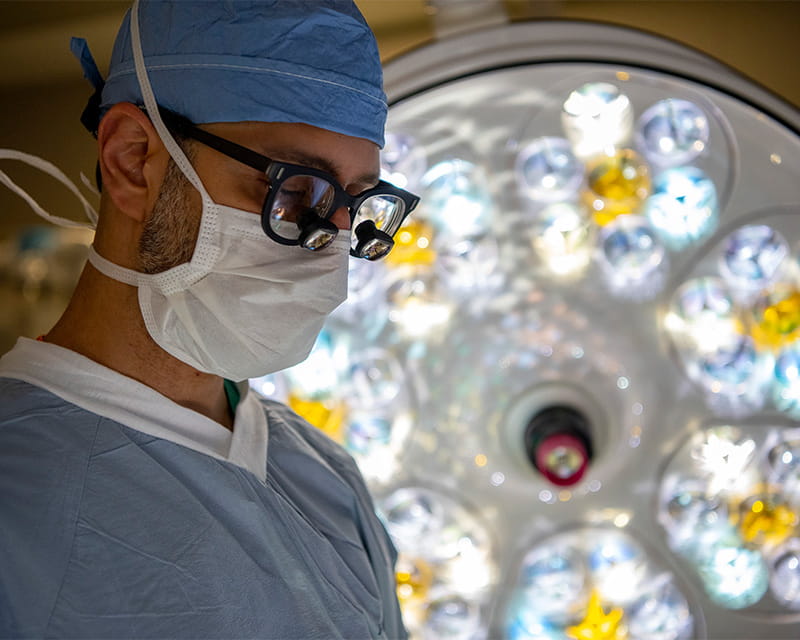
Ohio State basic scientist researches role of key proteins in pancreatic cancer
 Patients with advanced or metastasized GI cancer—even those who may have exhausted traditional therapy options—can benefit from evaluation and treatment at The Ohio State University Comprehensive Cancer Center – Arthur G. James Cancer Hospital and Richard J. Solove Research Institute (OSUCCC – James), which offers access to clinical trials and innovative therapies that may not be offered at their current health care facility. Referrals and consultations are always welcome.
Patients with advanced or metastasized GI cancer—even those who may have exhausted traditional therapy options—can benefit from evaluation and treatment at The Ohio State University Comprehensive Cancer Center – Arthur G. James Cancer Hospital and Richard J. Solove Research Institute (OSUCCC – James), which offers access to clinical trials and innovative therapies that may not be offered at their current health care facility. Referrals and consultations are always welcome.
As one of only a few cancer centers in the country funded by the National Cancer Institute to conduct both phase I and phase II clinical trials, the OSUCCC – James offers patients access to more clinical trials than nearly any other cancer hospital in the region. It also offers more of the most targeted, most effective treatment options, many of which are available only at the OSUCCC – James. Because of these far-reaching options, patients from across the nation seek care here.
“Regardless of their current prognosis, we are always willing to evaluate and discuss potential treatment options with any patient with advanced GI cancer, even those who have been told that there are no further possibilities for them elsewhere,” according to surgical oncologist Alex C. Kim, MD, PhD.
Some of the most progressive cancer therapies available at the OSUCCC – James are cytoreductive surgery (CRS) and hyperthermic intraperitoneal chemoperfusion (HIPEC).
The OSUCCC – James is one of a select few centers in the country offering HIPEC, and it’s qualified as a high-volume location. HIPEC delivers a concentrated, heated cytotoxic chemotherapy directly to the abdomen during surgery to eliminate microscopic or remaining cancer cells.
“This regional therapeutic approach allows delivery of chemotherapy to a specific site in the body without the typical adverse effects observed with systemic treatment,” Dr. Kim explains.
Specializing in patients diagnosed with complex gastrointestinal malignancies, with a focus on advanced or metastatic cancers originating from the appendix, colon, rectum, stomach, small intestine and peritoneal surface, Dr. Kim is passionate about offering hope for not only a longer life, but also a better quality of life.
“Cancer regional therapies, including HIPEC, are exactly the type of therapy that allows us better ability to deliver on this promise,” he says.
Dr. Kim also collaborates with OSUCCC – James gynecologic oncologists to care for ovarian cancer patients.
Keeping this concern for quality of life in mind and to maximize overall health, even during cancer treatment, older patients at the OSUCCC – James can have all aspects of their care coordinated with a team of specialists through the Cancer and Aging Resiliency (CARE) clinic.
Established in 2016, the OSUCCC – James’ CARE Clinic provides a convenient, “one-stop” experience for older adults living with cancer. During a single visit, patients see a pharmacist, physical therapist, nutritionist, audiologist, nurse case manager, a nurse specializing in cognitive assessment and a hematologist/oncologist or geriatrician/palliative care physician.
“Cancer doesn’t happen in isolation, so it’s equally important that we proactively prevent or address other health issues as well, including mental health, medicine management, memory loss, risk of falling, insomnia, fatigue, isolation, nutrition or other common concerns that impact our older patients,” Dr. Kim explains.
He also emphasizes the benefits of the active cancer research program, including basic, translational, clinical trials and health care outcomes in advanced GI cancers, at the OSUCCC – James.